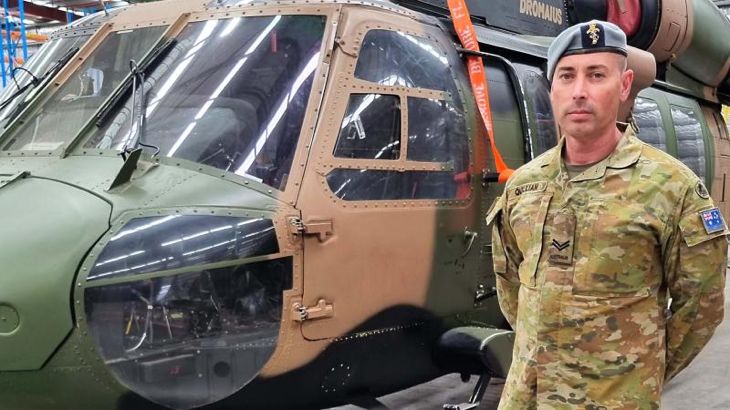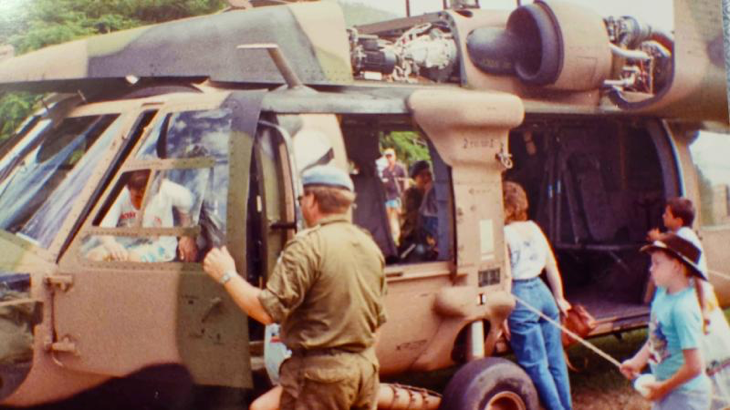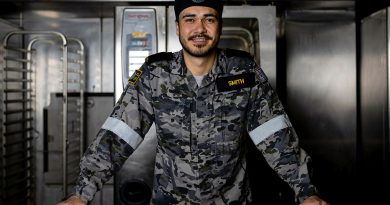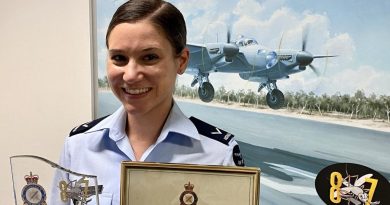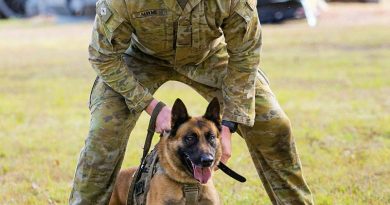Open day thrill leads to solid career

Following the announcement Army will acquire UH-60M Black Hawks, Warrant Officer – Class 2 Max Bree spoke to three operators of the retired S70A-9 who, coincidentally, have all had an affinity with the aircraft since childhood. Among them was Corporal Paul Quilliam.
CAPTION: Corporal Paul Quilliam next to an old S70 Black Hawk at the Rotary-Wing Aircraft Maintenance School in Oakey. Story by Warrant Officer Class 2 Max Bree.
Corporal Paul Quilliam first saw Army helicopters at a Lavarack Barracks open day in the early 1990s.
He recently realised he first sat in the aircraft that would dominate his career after uncovering a photo from that day.
“I never realised it was a Black Hawk until I found the old photo,” he said.
Corporal Quilliam hoped to become a Black Hawk avionics technician, but during training was told there were no more positions – until he was panelled for a Black Hawk-type course with two weeks to go.
Corporal Quilliam later worked on the S-70 type for six years until they were retired.
“You’d see them come in fast, flare up, then quickly land to extract troops,” he said.
“It was really agile; it got the job done and got out of there quickly.”
Despite the aircraft being more than 30 years old, Corporal Quilliam said they were reliable and easy to work on.
“It was also able to deploy very rapidly at short notice; we could be ready to go quickly,” he said.
“If there was a quick, turnaround task, it was achievable to have the aircraft rapidly folded and ready for a C-17 load.”
The modern UH-60M, colloquially known as ‘Mike’ models, will include modern avionics for tradies like Corporal Quilliam to look after.
But they won’t use the old Black Hawks’ manual test equipment, thanks to on-board diagnostic systems and plug-in fault-finding gear.
“Mikes have a full-glass cockpit with multi-function displays, and the avionics package will be fully digital; as opposed to the S70’s old-school mechanical instruments,” Corporal Quilliam said.
“For a lot of stuff, we’ll be able to plug in and have it self-diagnose with test equipment. A lot of the time, it will be able to tell you what the problem is and where to go.
“That will give you quicker outcomes for repair and maintenance.”
Corporal Quilliam is an instructor at the Rotary Wing Aircraft Maintenance School and hopes to become a Black Hawk instructor or post back to an operational unit working on Mike models.
“If you told my younger self he’d be working on Black Hawks one day, he wouldn’t have believed you, but he’d be pretty impressed if he knew,” Corporal Quilliam said.
CAPTION: A young Paul Quilliam steps out of the cockpit of an Australian Army Black Hawk during an open day at Lavarack Barracks in the early 1990s.
.
.

.
.

